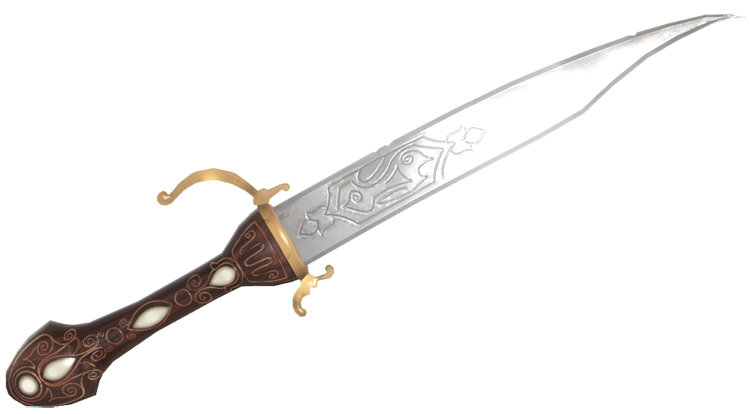
This image has format transparent PNG with resolution 750x414.
You can download this image in best resolution from this page and use it for design and web design.
Dagger PNG with transparent background you can download for free, just click on download button.
A dagger is a knife with a very sharp point and one or two sharp edges, typically designed or capable of being used as a thrusting or stabbing weapon. Daggers have been used throughout human experience for close combat confrontations, and many cultures have used adorned daggers in ritual and ceremonial contexts. The distinctive shape and historic usage of the dagger have made it iconic and symbolic. A dagger in the modern sense is a weapon designed for close-proximity combat or self-defence; due to its use in historic weapon assemblages, it has associations with maleness and martiality. Double-edged knives, however, play different sorts of roles in different social contexts. In some cultures, they are neither a weapon nor a tool, but a potent symbol of manhood; in others they are ritual objects used in body modifications such as circumcision.
A wide variety of thrusting knives have been described as daggers, including knives that feature only a single cutting edge, such as the European rondel dagger or the Persian pesh-kabz, or, in some instances, no cutting edge at all, such as the stiletto of the Renaissance. However, in the last hundred years or so, in most contexts, a dagger has certain definable characteristics, including a short blade with a sharply tapered point, a central spine or fuller, and usually two cutting edges sharpened the full length of the blade, or nearly so. Most daggers also feature a full crossguard to keep the hand from riding forwards onto the sharpened blade edges.
Daggers are primarily weapons, so knife legislation in many places restricts their manufacture, sale, possession, transport, or use.
The earliest daggers were made of materials such as flint, ivory or bone in Neolithic times.
Copper daggers appeared first in the early Bronze Age, in the 3rd millennium BC, and copper daggers of Early Minoan III (2400–2000 BC) were recovered at Knossos.
In ancient Egypt, daggers were usually made of copper or bronze, while royalty had gold weapons. At least since pre-dynastic Egypt, (c. 3100 BC) daggers were adorned as ceremonial objects with golden hilts and later even more ornate and varied construction. One early silver dagger was recovered with midrib design. The 1924 opening of the tomb of Tutankhamun revealed two daggers, one with a gold blade, and one of smelted iron. It is held that mummies of the Eleventh Dynasty were buried with bronze sabres; and there is a bronze dagger of Thut-mes III. (Eighteenth Dynasty), circa B.C. 1600. As late as Mene-ptah II. of the Nineteenth Dynasty (B.C 1300), we read it in the list of his loot, after the Prosopis battle, of bronze armour, swords and daggers.
Iron production did not begin until 1200 BC, and iron ore was not found in Egypt, making the iron dagger rare, and the context suggests that the iron dagger was valued on a level equal to that of its ceremonial gold counterpart. These facts, and the composition of the dagger had long suggested a meteoritic origin, however, evidence for its meteoritic origin was not entirely conclusive until June 2016 when researchers using x-ray fluorescence spectrometry confirmed similar proportions of metals (Iron, 10% nickel, and 0.6% cobalt) in a meteorite discovered in the area, deposited by an ancient meteor shower.
One of the earliest objects made of smelted iron is a dagger dating to before 2000 BC, found in a context that suggests it was treated as an ornamental object of great value. Found in a Hattic royal tomb dated about 2500 BC, at Alaca H?y?k in northern Anatolia, the dagger has a smelted iron blade and a gold handle.
In this page you can download free PNG images: Dagger PNG images free download